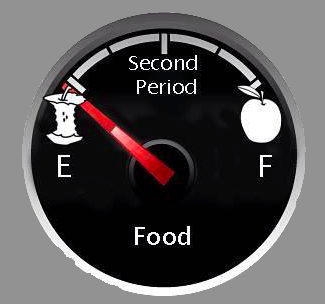If you saw a fatigued student in class, you would probably assume that person didn’t get enough sleep and not think much of it. But what you may not know is that this person hasn’t eaten anything today and needs a snack immediately if they want to absorb anything happening in class.
Food throughout the day is underratedly important in the halls of Staples. Take it from a girl who is similar to most students struggling with hunger and little energy in school.
Ellie Aronson ’16 woke up to the ringing of a shrill alarm, caught the bus in the nick of time, and hustled into class by 7:30.
As second period rolled around, Aronson watched the clock tick in Algebra. 8:27. 8:31. 8:36.
She started to feel the effects of not having breakfast as her stomach groaned for a few bites of an apple or crackers while finishing a worksheet. Aronson only had to make it another hour and 20 minutes until lunch. Her thoughts started drifting to her weekend plans and getting back home to her dog, Sophie.
By now, any of Ellie’s food from breakfast had long passed through the villi (small hair-like organisms that absorb the nutrients, water, and electrolytes from food in the small intestine). The body had converted this glucose to energy that can be stored.
However, according to Livestrong, the typical timing between meals should be three or, if necessary, four hours. Without breakfast or a morning snack, Aronson hadn’t eaten since almost 13 hours ago, clearly almost depleted of any glucose the food from last night provided.
Next period, the long hand on the clock struggled to reach 11:20 A.M., seemingly hesitant to let each minute pass. As the bell wailed, her torso suppressed another ache, finally on its way to reprieve. Lunch. A vibrant display of foods, the smell of fresh-baked cookies, melty paninis, and scarlet berry smoothies. Aronson waited to sip her first spoonful of Au Bon Pain’s Chicken Noodle Soup.
In the glorious cafeteria, with food in their stomachs, each of Aronson’s friends seemed a little brighter. While munching on Sun Chips and bagels, they discuss courses for next year and Aronson’s favorite moments of “The Office.”
This haven is unfortunately temporary and soon Aronson was back stuck in front of her desk and faced with an in-class Shakespeare essay. Aronson reckoned, looking tired already, “After lunch, I can’t think straight at all.”
The last two periods’ objection were using what little energy and brain power left to finish the day, catch the bus, and face a treacherous pile of homework.
Towards the end of the day, Aronson had last eaten three and half hours ago, and hears her stomach groan again. According to Everyday Health, blood sugar dips less than three hours after eating, presenting an answer to her fatigued, weary body.
The story of Aronson’s typical day is mirrored by the lives of most Staples students.
While sometimes there is an occasional muffin break, more often than not, students go through the day completely without any snacks or food breaks besides a meeger lunch.
Nurse Susan Bosch said that, “We [nurse staff] see consistently about 80 students a day, reporting that “even about 10% a day is related to lack of food or lack of sleep.”
Some students, like Aronson, wonder where drowsiness and fatigue originates, unaware that healthy munching throughout the day is equally as important as sleep.
Bosch compared lack of nutrition to cars saying, “If you’re driving your car and there’s no gas in the tank, it won’t go. If there’s no energy in your body, you won’t go. You simply won’t have gas to work.”
Aronson also recognizes that it is infinitely more difficult to assess well after not eating for an extended period of time. In the grades-driven society at Staples, students might want to pay a little more attention to snacking if they saw how it could affect their grades.
According to The United Nations System Standing Committee on Nutrition, not eating breakfast reduces test performances by four percentiles. You may be having this problem as well. While some may eat breakfast, those who eat at 7 A.M. will barely have enough energy to last the four hours until lunch.
Aronson, similar to the rest of the Staples population, has a host of reasons why snacking during the day would be impractical. She says that there is so little time in the mornings to pack a snack, teachers don’t allow it in classes, and it can be uncomfortable to eat in the middle of class.
But, all of the struggles boil down to this: are you willing to risk your health (and a four percent difference on a test) for not eating just a few bites of cereal in the morning?
Ellie wants to start bringing a snack.















































